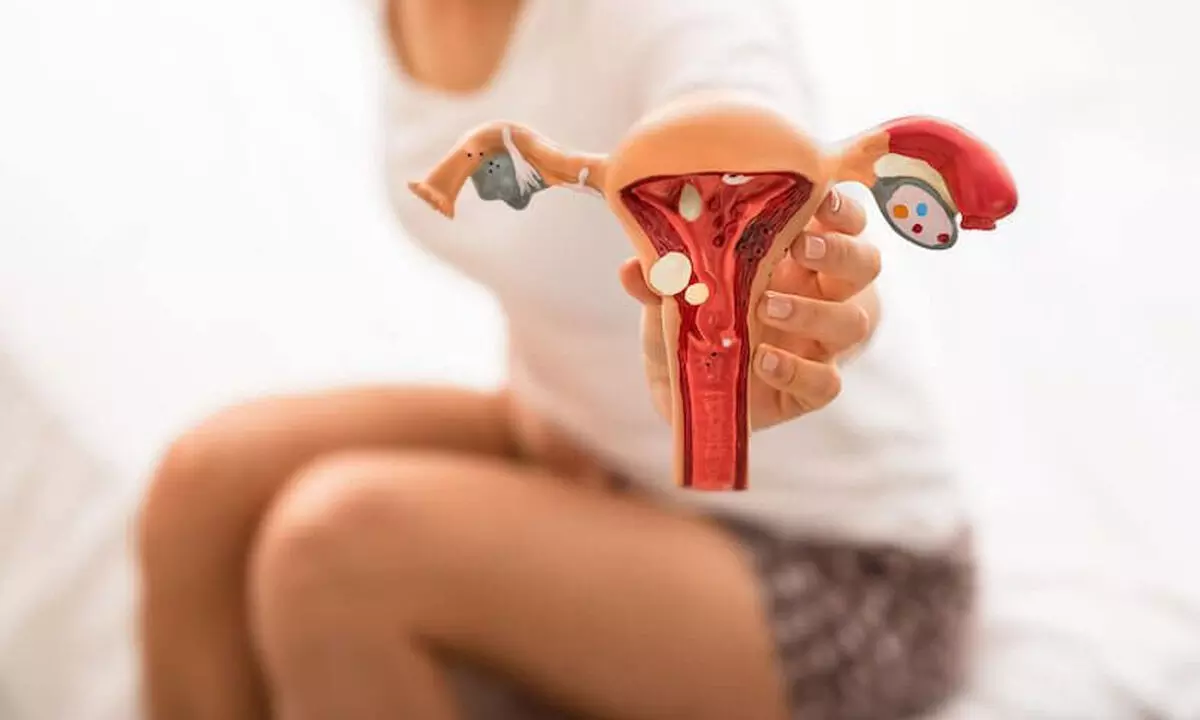Live
- Gold gains 30 pc in 2024, silver 35 pc up on COMEX this year: MOFSL
- Delhi HC dismisses anticipatory bail plea of ex-IAS trainee officer Puja Khedkar
- Untouched Goa Beaches You Must Visit in January
- Muzigal launches its State-of-the-art Music Academy in Nallagandla, Hyderabad
- Thoughtful Christmas Gifts for Every Loved One
- South Korea: Finance minister silent on martial law probe amid speculation on acting president's role
- Karnataka Minister Laxmi Hebbalkar Vows To Pursue Justice Against CT Ravi
- Stands By Vijayaraghavan Amid Row Over Remarks On Gandhis
- Karnataka Legislative Council Chairman Denies Recording Controversial Exchange
- Lexus India to Redefine Luxury Mobility at Bharat Mobility Global Expo 2025
Just In

Endometriosis: A silent condition affecting millions of women worldwide
Endometriosis affects around 2.5 crore women in India, which is four out of every 100 women. According to the World Health Organization (WHO), the condition is believed to affect 10% (190 million) of women worldwide who are of reproductive age. Despite its prevalence, endometriosis often goes undiagnosed or misdiagnosed due to a lack of awareness among the general public
Endometriosis affects around 2.5 crore women in India, which is four out of every 100 women. According to the World Health Organization (WHO), the condition is believed to affect 10% (190 million) of women worldwide who are of reproductive age. Despite its prevalence, endometriosis often goes undiagnosed or misdiagnosed due to a lack of awareness among the general public.
Dr. Teji Dawane, Senior Consultant, Obstetrician and Gynecologist at Motherhood Hospitals, explains that endometriosis usually begins during the time frame when young women start having menstrual periods. "Women are more likely to experience endometriosis because the condition usually occurs in the lining of the uterus, the ovaries or the fallopian tubes.The cause of endometriosis isn't specified however estrogen, a hormone responsible for the development and regulation of the female reproductive system can spread or worsen endometriosis pain," she explained.
Endometriosis is a condition where the tissue lining the uterus grows outside, causing pelvic pain, heavy menstrual bleeding, and infertility. Dr. Teji further explains that estrogen, a hormone responsible for the development and regulation of the female reproductive system, can spread or worsen endometriosis pain. "When the endometrial-like tissue grows outside of the uterus, it forms endometriotic lesions causing pain. Endometriosis can also lead to adhesions, or scar tissue between organs in the pelvis and abdomen. If endometriosis continues to remain undetected, the adhesions or scar tissues can damage the affected organs, resulting in infertility," she added.
Common symptoms of endometriosis include painful cramps, pelvic pain, and difficulty with urination and bleeding. "Painful period cramps before or during menstruation which may result in pelvic pain, lower back and abdominal pain. Difficulty with urination, excessive bleeding, and infertility are some of the common symptoms in endometriosis," she continued.
Endometriosis can cause infertility, adhesions, and cysts. "When diagnosed with endometriosis, women may experience complications such as infertility where women experience difficulty while conceiving due to the damage in the fallopian tubes or the ovaries. Other complications may occur if the endometriosis tissue lies near the ovaries resulting in formation of adhesions of endometriosis tissue which joins the organs together or even formation of ovarian cysts or fluid filled sacs which is large and painful," said Dr. Teji.
It can affect anyone who menstruates and is more common in women aged 18-32 due to fluctuating estrogen levels and retrograde menstrual flow. "Women under 18-32 are more likely to experience endometriosis because one of the reasons behind endometriosis is the level of estrogen which fluctuates and may potentially worsen endometriosis. Another reason behind endometriosis is the retrograde menstrual flow where some of the tissue shedding during menstruation flows through the fallopian tube into other areas of the body, such as the pelvis," she added.
Endometriosis diagnosis has a negative effect on a woman's physical, mental, and social well-being. "Undergoing endometriosis poses daily challenges which can be translated to limitations in achieving objectives. Endometriosis in the later stages can decrease the quality of life due to severe pain, fatigue, depression, anxiety and infertility. Some individuals with endometriosis experience debilitating pain which hampers their day-to-day activities," explained Dr. Teji.
"Besides the usual symptoms, other signs of endometriosis may include fatigue, diarrhea, constipation, bloating or nausea, especially during menstruation hence it is important to recognise any symptom irrespective of the impact and intensity. This includes being regular with annual check up or follow up with a doctor. Endometriosis can be detected by procedures such as pelvic exam, ultrasound, Magnetic resonance imaging (MRI), laparoscopy," she said.
Although it is impossible to prevent it, one can reduce chances of developing it by lowering the levels of the estrogen. "Exercising regularly to keep a low percentage of body fat which helps decrease the amount of estrogen circulating through the body. Undertaking hormonal birth control methods, such as pills, patches or rings with lower doses of estrogen with the doctor's consultation. Maintaining the consumption of alcohol and caffeinated drinks as it raises estrogen levels. Reducing smoking and other such lifestyle changes can be incorporated to thicken the lining of the uterus during the menstrual cycle," she concluded.

© 2024 Hyderabad Media House Limited/The Hans India. All rights reserved. Powered by hocalwire.com







